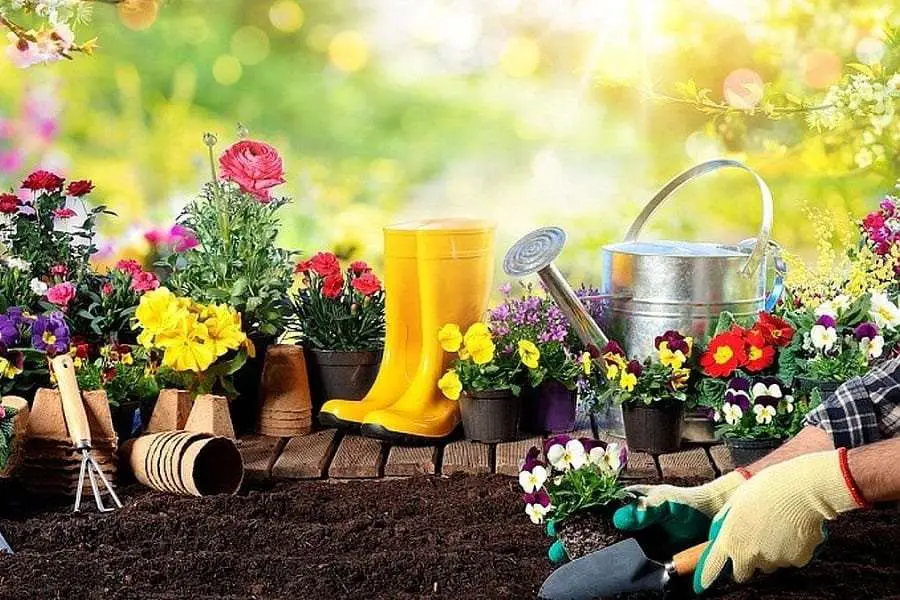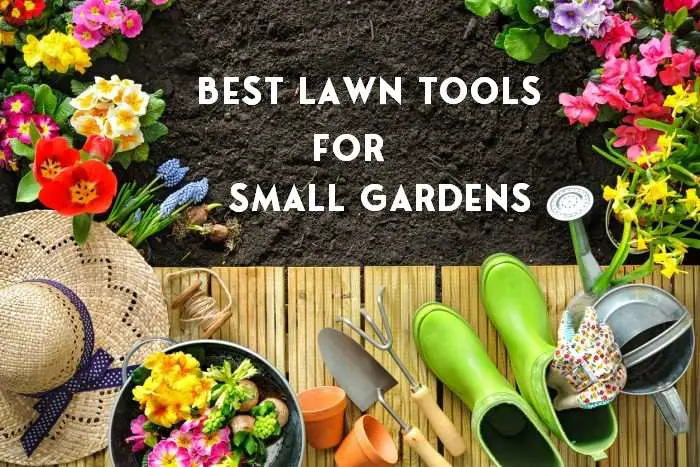Table of Contents
Most individuals find the market’s range of lawn tools and equipment overwhelming. Before investing in lawn tools, you should examine the price and how long you’ll retain the product. You should also research the best lawn tools on the market to meet your needs and those of your grass.

Before buying lawn care tools, consider your lawn’s size, terrain, obstructions (such as trees, flowerbeds, or playsets), and the tools’ quality. As said, prices might vary greatly for the same type of lawn care equipment, Eco-friendly lawn tool alternatives, Manual lawn tool options and Lawn tool accessories. So you must pick best lawn tolls based on its quality and budget.
Here’s a list of 16 Best lawn tools for small gardens. Consider your options before buying a lawn tool. You’ll be well-informed about the investment you’re making.
1. Shovel
Even though a shovel is a basic gardening tool, you’ll probably use it frequently to dig holes, so you should invest in a decent one.
While shovels with wood handles can be used for commercial work, most experts prefer ones with fiberglass or steel handles. A shovel is typically a great piece of equipment to spend a little extra money on for higher quality.
Select a shovel with a stainless steel head. It is durable, lightweight, and simple to clean. Remember to sharpen your shovel a few times a year as well.
2. Rakes
You need two different kinds of rakes:
- Steel rake
- Leaf rake
For more challenging tasks like moving earth, gravel, compost, or mulch, use a steel rake with poise. Use the smaller leaf rake for leaves, twigs, and other light debris.
Both kinds of rakes normally work just fine with wooden handles. Even when raking soil or gravel, it’s typically not necessary to use a fiberglass or steel handle.
3. Stand Up Weeders
With Grampa’s Weeder, you can get rid of bothersome weeds in your garden and lawn. You can get rid of weeds without bending or kneeling by sticking the metal pegs into the ground and then pressing the lever down with your foot.
4. Pruning Shears
A set of pruning shears with a long handle is necessary. They are employed to cut down branches. Typically, branches up to an inch thick can be chopped with hand-powered pruning shears. You’ll need gas or electricity-powered shears for anything greater.
5. Lawn Mower
The largest and most expensive piece of lawn care equipment you’ll purchase is probably your mower. Don’t be scared to spend a sizable portion of your budget on a top-notch lawnmower. Using a strong, well-built mower enables you to finish tasks swiftly and precisely. Additionally, it promotes professionalism.
Typically, you want a blade with a diameter of 30″ or greater for commercial applications. Anything smaller will slow down how quickly you can cut the grass. Additionally, smaller mowers typically require more maintenance and breakdowns.
6. Snow-blower
Do you have a job where there is a lot of snow? Fortunately, you can continue operating throughout the winter. Professional landscapers frequently move between mowing lawns and shoveling snow.
You want the most potent snow thrower your money will allow, similar to a lawnmower. Thankfully, you do not have to purchase a snowblower right away. Start your business in the warmer months to generate revenues that will enable you to purchase winter clothing when you need it.
7. Grass cutter
To combat weeds and grass, you’ll need a trimmer, sometimes known as a weed whacker. Against trees, walkways, and other lawn features, it serves as a finishing edge. Trimmers are powered by either gas or electricity, just like lawnmowers.
8. Leaf Blower
A hand-powered leaf rake should only be used for minor touch-up jobs. For the majority of your leaf collecting, use a leaf blower. It is the quickest and most effective lawn care equipment for gathering a lot of stray leaves.
Although there are leaf blower electric variants, gas-powered machines are much more common for business use. The amount of electricity needed to run a leaf blower is enormous. Typically, dealing with gas throughout the workplace is simpler.
9. Fruit Picker
Why should you allow perfectly delicious fruit to fall to the ground where it will rot and invite pests? To preserve ripe fruit from your apple, orange, or pear trees, get the Eversprout Fruit Picker. The fruit is safely pulled from the tree by the rake-like prongs and placed in the coordinating basket.
10. Hedge cutter
When choosing a hedge trimmer, you should put comfort and portability as your main priorities. In contrast to a mower that you push, a hedge trimmer requires prolonged holding. Even if you’re in terrific shape, it’s exhausting. You may stay comfy all day long with a lightweight trimmer that has pleasant, ergonomic grips.
11. Shoe Aerators
Your compacted lawn has two intimidating options: manually aerating it with a coring aerator tool or renting a gas-powered aerator. The thatch can be removed in another method, though. Instead, invest in a pair of aerator shoes, which create tiny holes in the grass to allow air, water, seeds, and fertilizer to penetrate the soil where they are most needed.
12. Garden Saw
Due to its adaptability, a billhook saw is one of the best gardening tools. They are made to saw branches, cut vines, sever roots, and trim shoots and stems. Try a 13- or 18-in. billhook saw if your garden is out of control or overgrown with coarse decorative grasses that have to be chopped back. This Fiskars model has a curved blade that resists rusting for quick pull cuts and a coarse saw edge for cutting through tough grass and branches.
13. Gloves
You need four different kinds of gloves:
• Washable synthetic gloves – The synthetic gloves are best used with dry materials in general-purpose applications.
• Latex-coated cotton gloves – The latex-coated cotton gloves are for handling moist dirt.
• Leather Gloves – Leather gloves offer the greatest level of security. They are the ideal option for digging, planting, and large projects
• Gorilla Hands – Gorilla Garden Hands from Pure Garden will protect your hands! These large scoops support your wrists and shield your hands from yard waste like thorns, sharp twigs, and pests. Additionally, manage leaves like an expert.
14. Buckets
Although not the most interesting instrument, buckets are one of the most practical. There should be plenty of buckets available. They can be used for carrying things, getting rid of trash, cleaning up, and other things.
The best choice is heavy-duty plastic buckets. Plastic buckets maintain their excellent condition even in moist environments, while metal buckets might rust or corrode after repeated exposure to water. Plastic buckets are also slightly flexible, making them simpler to use and store.
Make sure the handles on the buckets you choose are strong. To help with holding comfort, it ought to contain an ergonomic part.
Additionally, select a bucket that has measurements printed on the inside. This lets you transport certain amounts of liquid without needing a separate measuring tool.
15. Garden Pop-Up Bags
Make it simpler to remove leaves and debris from your yard chores. As their name implies, these pop-up garden bags expand into a strong container that you can quickly fill with leaves and other trash. When you’re finished, fold them back into their flat state and hang them in your shed or garage. Making yard work simpler!
16. Fertilizing Tools
First, buy a broadcast granular spreader. It spreads fertilizer in the form of tiny spheres over a huge region. It will primarily be used on lawns.
Additionally, you need a pressure sprayer. It is used to dispense fertilizer in liquid form. Liquid fertilizer is typically sprayed on plants or in gardens.
Additionally…
Safety Equipment
Don’t forget to protect your crew from unintentional harm. The bare minimum of safety equipment. Shirts, gloves, long sleeve shirts, ear protection, eye protection, and ear protection.
Additionally, if you plan to operate around trees, rocks, or heavy machinery, steel-toed boots are a good idea.
Conclusion
Besides the common lawn tools listed above, there are many other tools that can be used for any lawn project.
The best way to choose the right tool for you is to learn about the different kinds, think about how often you’ll use it and what it will be used for, read reviews online, and ask others (friends, family, or store employees) what they use for certain jobs.
You can always talk to our lawn care experts if you have questions or want tips on how to take care of your lawn.
All the information & photo credit goes to respective authorities. DM for removal please.
Related: Rei Camping Checklist you might want to bring on your next camping trip

